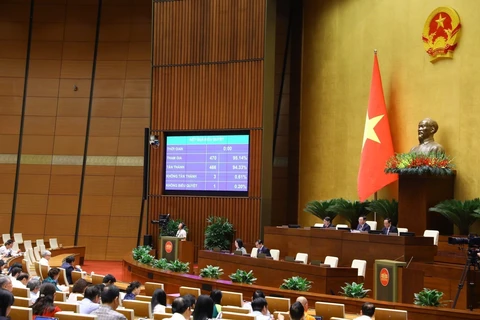Hanoi (VNA) - Global economy in 2023 saw ‘fierce’ headwinds. They put the domestic economy under undue pressure. However, the financial sector has taken on its proactive role by issuing fiscal policies to navigate the turbulances to stimulate economic recovery and growth.
On the first days of 2024, Minister of Finance Ho Duc Phoc has granted VietnamPlus an interview on the matter.
Tax reduction, exemption of 200 trillion VND
What’s your take on Vietnam’s performance in fulfilling finance-state budget tasks in 2023?
Minister Ho Duc Phoc: In 2023, the world continued to see political, economic, and social complexities, significantly influencing Vietnam's economic recovery and growth. Despite these challenges, the financial sector has effectively and decisively executed assigned tasks.
Building and improving the legal framework is of the Ministry of Finance’s constant concern. The Ministry has been proactive in institutionalizing the Party’s guidance and visions, the State’s policies, as well as promoting global integration.
In doing so, it expects to effectively assist the State in managing its finance and state budget.
Last year, we submitted to the National Assembly for approval the Price Law (amended) and the Assembly passed 05 Resolutions relating to Finance. To date, the Ministry of Finance has developed and submitted to the Government to promulgate 19 Decrees and 4 Decisions, review 15 Draft Decrees and 2 Decisions for later promulgation. We also duely issued 64 Guiding Circulars in Finance-State Budget sector.
 Many solutions on tax exemption, reduction and extending payment deadlines for taxes, fees, charges, and State budget collection have promptly removed difficulties facing the economy and businesses in particular. (Photo: Vietnam+)
Many solutions on tax exemption, reduction and extending payment deadlines for taxes, fees, charges, and State budget collection have promptly removed difficulties facing the economy and businesses in particular. (Photo: Vietnam+) The Ministry operates a comprehensive, flexible, and targeted fiscal policy regarding state budget management. This approach is particularly vital in an economic landscape still grappling with post-pandemic challenges, where the resilience of businesses is limited.
Always standing alongside businesses and the public, the Ministry proactively recommended and submitted numerous solutions for tax exemptions, reductions, and deferrals, as well as the postponement of fees, charges, and other state budget revenues. These measures, estimated at 200 trillion VND, aim to mitigate economic challenges, enhance cash flow for businesses, support socio-economic recovery and development, and contribute to nurturing revenue sources for the state budget. This represents a pivotal milestone, vividly illustrating fiscal policy's positive and impactful role in stabilising the macroeconomy and propelling economic recovery and growth.
Moreover, the Ministry of Finance has proactively presented a resolution to the Government and the National Assembly for approval, addressing additional corporate income tax regulations to counter global tax base erosion. This measure, set to be implemented in Vietnam in 2024, underscores the nation's proactive engagement on the international stage. It reaffirms our country's right to collect taxes on production and business activities within our territory, aligning with international regulations and domestic laws.
Simultaneously, the Ministry of Finance has steered tax and customs authorities towards enhanced revenue management. Leveraging information technology systems and big data applications, these efforts aim to meticulously oversee revenue, manage risks, and thwart fraudulent activities, particularly invoice usage and value-added tax refunding.
Budget collection surpasses target
In your opinion, what is the most significant achievement attained in State budget management?
Minister Ho Duc Phoc: With the concerted efforts of the whole sector, the overall outcomes in state budget revenue for the entire year are exceptionally positive. These achievements stand as a significant milestone in effectively managing the state budget for the year 2023.
The estimated state budget revenue for 2023 surpasses projections by approximately 5 per cent. When factoring in tax exemptions and reductions, this year's budget revenue exceeds the National Assembly's assigned estimate by an impressive 9-10 per cent.
It was so notable amidst the lingering economic challenges post-pandemic and the constrained resilience of businesses, coupled with the persistent implementation of various tax and fee exemption and reduction policies to alleviate hardships and support businesses and citizens.
Regarding state budget expenditures, the Ministry of Finance has collaborated closely with ministries, sectors, and localities to ensure stringent, thorough, economical, and effective management of state budget allocations.
At the same time, the Ministry has advised the Government to accelerate disbursement of public investment and investment from National Target Programs to create momentum for economic recovery and growth.
In 2023, we strived to achieve balance and ensure resources for a significant increase in the base salary, elevating it from 1.49 million VND per month to 1.8 million VND per month, constituting a notable 21 per cent increment starting from July 1.
This adjustment holds immense significance, particularly considering the challenges of the past three years, during which the impacts of the COVID-19 pandemic necessitated a focus on epidemic prevention, leaving salary reform unaddressed and contributing to difficulties faced by a segment of civil servants. It also sets a crucial foundation for the ongoing implementation of comprehensive salary policy reform in 2024, in accordance with the Party's Resolution 27-NQ/TW.
A noteworthy success in fiscal policy management is the effective control of overspending and public debt management. This achievement has been recognised by credit rating agencies and international organisations, characterising it as sustainable and indicative of the capability to implement expansionary fiscal policies.
The estimated 2023 budget deficit is anticipated to be below 4 per cent, a figure lower than the 4.42 per cent limit sanctioned by the National Assembly. By the close of 2023, public debt is projected to be approximately 37 per cent of GDP, significantly lower than the National Assembly's established ceiling of 60 per cent. Government debt stands at around 34 per cent of GDP, also considerably below the ceiling of 50 per cent. An increasing domestic debt balance and a gradual decrease in foreign debt mark this positive debt structure.
With the current low debt level relative to the established ceiling and a favourable debt structure, the Ministry of Finance has advocated for the government to restructure public debt. Vietnam, therefore, possesses ample flexibility in deploying loans for substantial projects that can serve as key drivers of the economy, fostering the fastest and most sustainable economic efficiency.
The financial markets persist in consolidating and addressing challenges promptly to facilitate healthier, more open, and transparent development.
Arduous tasks await Finance sector in 2024
It is forecasted that global and domestic economic situations to still face challenges, what do you expect for the economy next year and do you have any recommendations for the Government in managing financial-state budget?
Minister Ho Duc Phoc: Looking ahead to 2024, amidst a socio-economic landscape presenting both opportunities and challenges, the anticipated difficulties in executing financial and state budget tasks are expected to outweigh the advantages. The financial sector faces a substantial undertaking with an estimated state budget revenue of 1.7 quadrillion VND and projected state budget expenditure of 2.1 quadrillion VND. The state budget deficit is foreseen to be VNĐ399 trillion, approximately 3.6 per cent of GDP.
The challenge for 2024 lies in judiciously employing fiscal policy to simultaneously propel economic growth, ensure macroeconomic stability, control inflation, and safeguard national financial security. Hence, the degree of relaxation in fiscal policy needs careful calculation and consideration to attain these multifaceted goals, particularly on macroeconomic stability and inflation control.
In this context, the paramount objective of the financial sector is to formulate and implement proactive, flexible, targeted, and pivotal fiscal policies. Concurrently, the focus is securing resources to execute socio-economic development tasks and bolstering security, defence, and social safety nets. This involves a concentrated effort on swiftly advancing critical infrastructure investment projects, fostering regional and inter-regional connectivity, and implementing wage and social insurance reform policies integral to organisational restructuring and streamlining.
There should be a continuous commitment to refining institutions and policies on state budget revenue, bolstering revenue management, and striving to surpass assigned revenue estimates to ensure resources for socioeconomic development goals.
Additionally, stringent control over state budget expenditures, increased spending savings, improved efficiency in the management, allocation, and utilisation of the state budget, reinforced financial discipline, ongoing public investment spending restructuring, and a targeted increase in public investment disbursement are emphasised.
Measures are being implemented to strictly control state budget overspending, public debt, and contingent debt obligations to adhere to safety limits. Furthermore, solutions aiming to restructure the public debt portfolio in a safe and sustainable direction continue to be pursued.
 The financial sector faces a substantial undertaking with an estimated state budget revenue of 1.7 quadrillion VND and projected state budget expenditure of 2.1 quadrillion VND. The state budget deficit is foreseen to be 399 trillion VND, approximately 3.6 per cent of GDP in 2024. (Photo: Vietnam+)
The financial sector faces a substantial undertaking with an estimated state budget revenue of 1.7 quadrillion VND and projected state budget expenditure of 2.1 quadrillion VND. The state budget deficit is foreseen to be 399 trillion VND, approximately 3.6 per cent of GDP in 2024. (Photo: Vietnam+) The Ministry continues to ensure the stable and secure operation of financial markets and financial services, taking strict measures against violations and fostering fair competition among economic sectors.
In the immediate future, the Ministry will manage financial and state budget tasks during the 2024 Lunar New Year (Tet) time to ensure normal production and business activities before, during, and after the Tet holidays. A rigorous deployment of state budget revenue and expenditure tasks in 2024 right from the year's onset is prioritised to achieve the set goals./.
Thank you Minister!



























